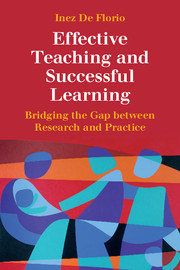Book contents
- Frontmatter
- Epigraph
- Contents
- Preface
- Introduction
- 1 Main Features of Scientific Research on Education
- 2 Important Types of Scientific Research on Education
- 3 Main Features of Evidence-based Research on Education
- 4 Meta-Analyses on Education
- 5 A Synthesis of Over 800 Meta-Analyses Relating to Achievement
- 6 Scaffolding Effective Teaching and Successful Learning
- 7 Planning and Starting the Lesson
- 8 Presenting Knowledge and Skills – Assertive Questioning
- 9 Guided and Independent Practice
- 10 Cooperative and Project-based Learning
- 11 Feedback – Reciprocal and Informative
- Concluding Remarks: Standards Need More Evidence
- References
- Index
2 - Important Types of Scientific Research on Education
Published online by Cambridge University Press: 05 June 2016
- Frontmatter
- Epigraph
- Contents
- Preface
- Introduction
- 1 Main Features of Scientific Research on Education
- 2 Important Types of Scientific Research on Education
- 3 Main Features of Evidence-based Research on Education
- 4 Meta-Analyses on Education
- 5 A Synthesis of Over 800 Meta-Analyses Relating to Achievement
- 6 Scaffolding Effective Teaching and Successful Learning
- 7 Planning and Starting the Lesson
- 8 Presenting Knowledge and Skills – Assertive Questioning
- 9 Guided and Independent Practice
- 10 Cooperative and Project-based Learning
- 11 Feedback – Reciprocal and Informative
- Concluding Remarks: Standards Need More Evidence
- References
- Index
Summary
MAIN TYPES OF RESEARCH: DESCRIPTION AND EXPLANATION
In general, researchers distinguish between two essential approaches: that is, between descriptive research and explanatory research. Descriptive research tries to answer questions such as: What is going on? What is happening? For example, you want to know how much time your students pass with social networking every day, because you suppose that some of your low-performing learners do not spend sufficient time on homework or independent reading. A look at official questionnaires will help you conceive a written survey to find out the exact amount of time your students spend on social networking per day. This example demonstrates that descriptive research is not always qualitative. Qualitative research findings are mostly written up in a report, but descriptive research can also consist of quantitative results, which means the findings are expressed in numbers.
Let us return to our example. You find out that your low-performing students indeed spend more time on social networking than your successful learners. This does not at all mean that there is a causal relationship between the students’ achievement and the hours spent on social networking. There may only be a correlation, a mutual relationship between the two, as in the case of the aforementioned example of Lemov's techniques.
Continuing with our imaginary research project, we now move to explanatory research. You must seek an answer to the question if the time spent on social networking really causes the respective students’ insufficient achievement. There may be other reasons for their unacceptable performance; for example, the lack of a place at home where they can study, or their exaggerated engagement in sports. The questions to answer are the following: Does x cause y? Is there a systematic effect between social networking and low achievement? You rightly think that answering questions regarding systematic effects is not as simple as finding out how much time your students spend on social networking. That is not all: If you obtain results that show systematic effects between the two phenomena, there is another important twofold question: How and why does social networking cause a deterioration of cognitive achievement?
- Type
- Chapter
- Information
- Effective Teaching and Successful LearningBridging the Gap between Research and Practice, pp. 27 - 44Publisher: Cambridge University PressPrint publication year: 2016



